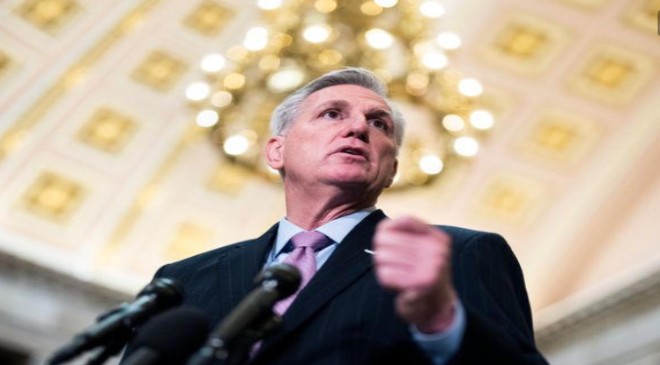House Speaker Kevin McCarthy said some things that were extremely misleading ― and then some things that were extremely revealing ― this week about what’s shaping up as the biggest economic policy fight of the coming year.
The statements came on Wednesday, when the California Republican appeared on Sean Hannity’s nightly Fox News broadcast and got a question about the debt ceiling, which is the statutory limit on how much money the federal government can borrow.
Also Read– Banning gas stoves gets Americans’ blood boiling
The government will officially hit that limit sometime in the next few days, Treasury Secretary Janet Yellen said on Friday. And while her department is preparing to take a series of “extraordinary measures” that will allow the government to keep borrowing for a few more months, it will run out of options eventually ― most likely, from the sounds of things, in late summer.
At that point, if Congress doesn’t pass a bill raising the debt ceiling, the federal government will have to stop borrowing. And if the government can’t borrow any more money, it won’t be able to pay all of its bills, which could have all kinds of consequences ― like no benefit checks for veterans and Social Security recipients, or damage to the U.S. government’s credit on which the global economy relies.
That all sounds pretty bad ― and it would be! It’s why, for most of U.S. history, lawmakers in neither party seriously threatened to block debt ceiling increases. But during the Obama presidency, Republicans began holding the debt ceiling hostage, refusing to vote for legislation raising it until Barack Obama and the Democrats would agree to spending cuts.
Now Republicans are threatening to do the same thing again. On Hannity, McCarthy defended this kind of brinkmanship with an analogy: “If you had a child and you gave him a credit card, and they kept hitting the limit, do you just increase the limit or change their behavior?”
Here is where we get to the first of McCarthy’s deeply misleading statements.
Refusing to raise the debt limit means refusing to pay bills that the federal government has already incurred. This isn’t stopping your kid from buying a new scooter. It’s refusing to pay for the smartphone he got last month.
In that same segment, McCarthy offered a broader justification for the Republican posture ― for why Republicans like him think holding up the debt ceiling increase is necessary, even if it seems extreme to some.
Also Read– Source: Biden team finds more docs with classified markings
Here is where we get to the statements that were not only misleading, but revealing as well.
History Tells A Different Story Than Kevin McCarthy
As McCarthy explained it, “one of the greatest threats we have to this nation is our debt,” noting that the ratio of public debt to gross domestic product ― a widely used metric for measuring the federal government’s debt levels ― had not been this high since World War II. McCarthy blamed the debt crisis on “runaway spending” and laid responsibility for that with the Democrats.
It’s absolutely true that the debt-to-GDP ratio hasn’t been this high since World War II (or at any other time in U.S. history). But it was so high back then because the U.S. faced a once-in-a-lifetime crisis that required a massive, sudden, one-time burst of spending. That’s precisely what just happened because of COVID-19, and why deficits (which lead to debt) suddenly spiked.
That’s not the full story, to be clear. Even before the pandemic, respectable analysts from a variety of political backgrounds were getting worried about rising debt-to-GDP levels.
But is it fair to pin this on Democrats, as McCarthy and his allies are?
Look at how deficits have changed in this century: They’ve risen under Republican presidents and fallen under their Democratic counterparts. (This chart from MSNBC’s Steve Benen illustrates the story nicely.)
Or look more closely at the signature legislative initiatives of these presidents during the brief periods when their parties also controlled Congress.
George W. Bush’s tax cuts from 2001 and 2003 had no offsetting revenue or spending cuts. Because of that, they represented more than $1.5 trillion of lost revenue over ten years, officials at the time predicted. For Donald Trump’s tax cut, which likewise had no offsets, the official projection was nearly $2 trillion in lost revenue.
By contrast, official estimates of the Affordable Care Act, aka “Obamacare,” suggested it would reduce deficits on net because it included some new taxes and cuts to other programs. The same goes for the Inflation Reduction Act, which Democrats passed and Biden signed last year.
That’s not to say Republicans are singularly responsible for higher deficits. The Bush tax cuts got some Democratic votes, for example. So did money for the war in Iraq, which, although temporary, had a significant fiscal impact.
But if one party is more responsible than the other, it’s hard to make a credible case that it’s the Democrats.
Also Read– McCarthy’s concessions spur fears of potential default, government shutdown
Republicans Vote Like They Care About Spending
While McCarthy said “debt” was the big problem, he spent much of his time in the interview decrying spending specifically. Here, finally, we get to the revealing part of the McCarthy quotes.
It’s not debt per se that bothers him or his GOP allies. It’s spending programs and the taxes that finance them.
McCarthy and the Republicans have their reasons. They think spending distorts the economy, that taxes take money unfairly from people who’ve earned it, and so on. And sometimes it’s an effective political slogan, especially when they attack spending in the abstract as wasteful or sending taxpayer money to purportedly undeserving beneficiaries.
But actually cutting spending in ways that would make a meaningful, long-term impact on deficits and debt would inevitably mean going after the three big entitlement programs: Social Security, Medicare and Medicaid.
These are wildly popular because so many Americans currently or will someday depend on them for their livelihoods and medical care. Attacks on these programs ― like Bush’s attempt to privatize Social Security, or Trump’s proposed cuts to Medicaid as part of Obamacare repeal ― have been politically catastrophic for Republicans.
That doesn’t scare some House Republicans ― among them, Jodey Arrington of Texas. He chairs the budget committee and has said he favors raising the eligibility age for Social Security.
“There are a lot of tough decisions for all of us to make across the board,” Arrington told HuffPost’s Arthur Delaney and Jonathan Nicholson. “The rubber will meet the road with the real decisions about bending the curve on spending and reforming programs.”
McCarthy is trying to be more careful, perhaps because he remembers a bit better just how politically toxic those cuts can be. At a press conference Friday, he insisted Republicans would “protect” Medicare and Social Security.
Also Read – Trump Attorney Sides With Supreme Court Knocking Down Case to Reinstate Him
But, as Arthur and Jonathan pointed out, McCarthy wasn’t specific about what he meant. That, too, may have been a revealing moment.

































